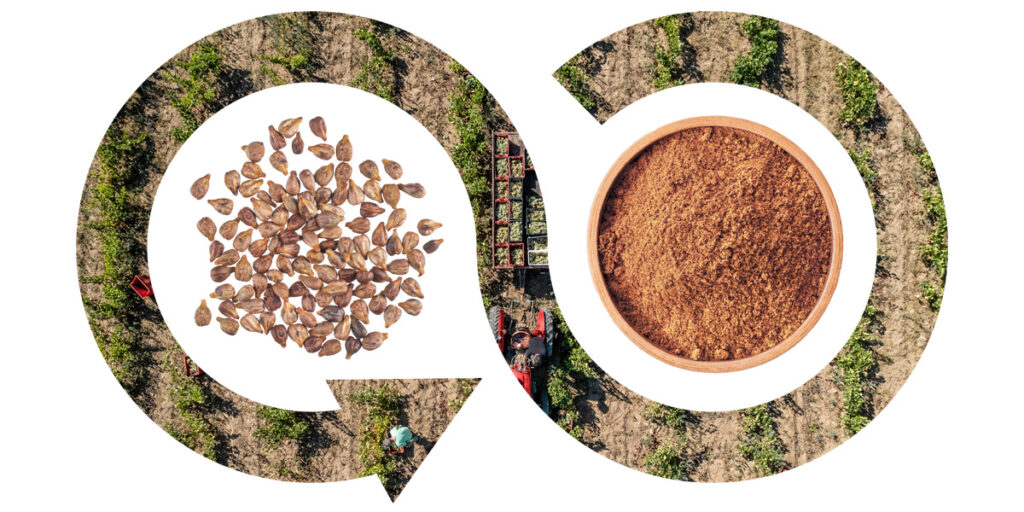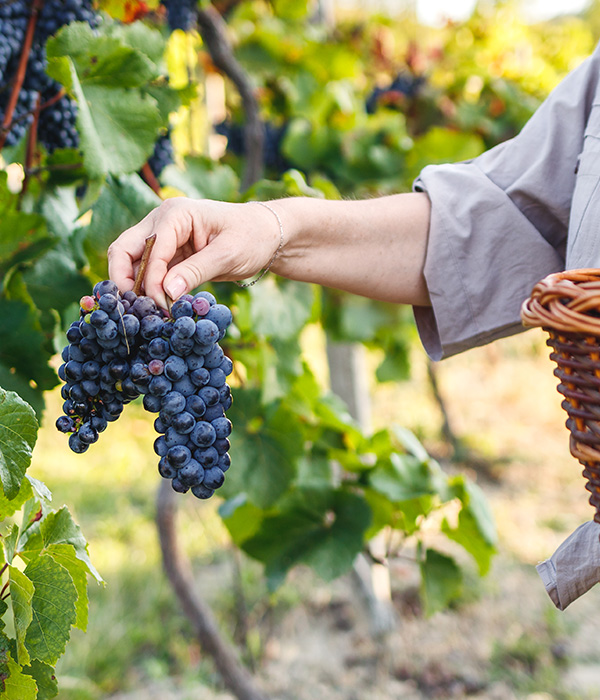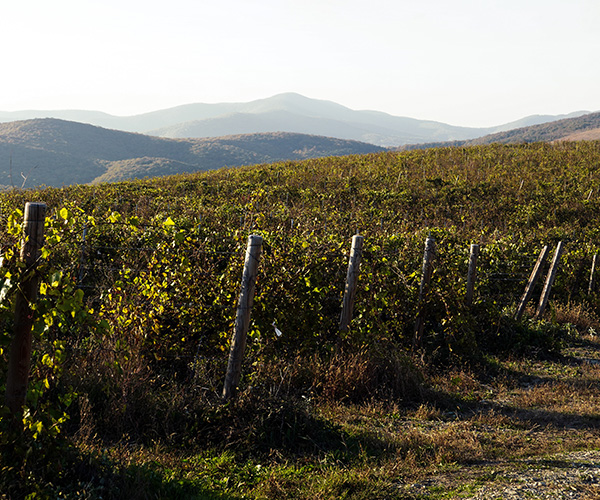The project will valorise
grapevine seeds


Gluten-free
The new additive will be by definition vegan and gluten-free. The use of the novel ingredient will be able to replace animal-based protein use and support the creation of new, more sustainable supply chains with significantly smaller environmental footprints. A comparison between the animal-based protein production and the PROSEED grape seed protein production shows that an 82% reduction of CO2 emissions is possible.


Nutritional
The project will valorise grapevine seeds, an abundant wine industry by-product, into a high-value nutritional ingredient to be used as an additive in the healthy food and beverages industry. The product will be sold in the form of powder.
frequently asked questions
The PROSEED project on Circular-based alternative PROtein extraction from grape SEEDs, is a European project that aims at the production and commercialisation of a new alternative protein product. The project will valorise grapevine seeds, an abundant wine industry by-product, into a high-value nutritional ingredient to be used as an additive in the healthy food and beverages industry. The production of this new plant-based protein addresses the primary issue of acute protein deficit in the European Union and enables the application of a circular economy model within the wine value chain.
The collective term ‘alternative protein’ (AP) refers to plant-based and other food-technology alternatives to conventional animal protein (meat, fish, dairy products, eggs, etc.). They include food products made from plants (for example, grains, legumes and nuts), fungus (mushrooms), algae, insects and cultured (lab-grown) meat.
A plant-based protein is simply put a protein derived from a plant source. This group can include pulses, tofu, soya, tempeh, seitan, nuts, seeds, certain grains and even peas. Pulses are a large group of plants, which include chickpeas, lentils, beans (such as black, kidney and adzuki beans) and split peas.
Grapes are one of the most extensively cultivated crops in the world, and about 75% of the total grape production is used to produce wine. In general, 20%–30% of the original grape weight is produced as pomace, which constitutes the skin, stem, residual pulp, seed, small pieces of stalks, and yeast cells from the wine fermentation process. Seeds and skins represent 38%–52% and 5%–10% of grape pomace, respectively.
In EU wine industry, 28M tons/year of grape are harvested while almost 5.6M tons of grape pomace are produced as side stream. For a long time, wine pomace has been an undervalued product due to lack of alternative uses with economic benefits. Nowadays, even due to a disparity in the management of these materials at a technical and regulatory level, about 60% of these 5.6M tons are currently used for the extraction of alcohol, grape seed oil, energy, etc. while the remaining part (40%) is destinated to a low waste-hierarchy stage (fertilizer or fuel). Indeed, traditionally, wine pomace has been used as fertilizer or animal feed, but it has drawbacks due to the presence of antinutritive compounds that negatively affect crop yields and animal weight gain, and it fails to exploit the full potential market of this by-product.[1]
Grape seeds contain fibre, proteins, lipids (fats and oil), carbohydrates, minerals, and between 5% and 8% of polyphenolic compounds (like tannins), depending on the variety and other factors, such as climate, soil, and degree of ripeness. Each of these constituents could be extracted from grape seeds and valorised as high-value compound.
[1] https://www.ccsenet.org/journal/index.php/jfr/article/view/33454
The extraction and use of the novel ingredient will be able to replace animal-based protein use and support the creation of new, more sustainable supply chains with significantly smaller environmental footprints. A comparison between the animal-based protein production and the PROSEED grape seed protein production shows that an 82% reduction of CO2 emissions is possible.
Caviro SCA and Caviro Extra have designed a protein extraction bioprocess based on a pilot grape seeds detannification process that utilises Ultrasound Assistant Extraction (UAE) – specifically Alkaline – Acidic Extraction (AAE) coupled with ultrasound technology – with the goal to scale the technology up to industrial level within 2024.
Yes, the protein that is extracted from the grape seeds is by definition vegan. During the extraction and production process no gluten-based products or ingredients have been used.
Yes, the protein that is extracted from the grape seeds is by definition gluten-free. During the extraction and production process no gluten-based products or ingredients have been used.
Yes, the product is GMO-free. It does not contain, does not derive and is not made up of Genetically Modified Organisms.
The product will be sold in the form of powder.
PROSEED is an EIT Food project that has received funding from the European Institute of Innovation and Technology (EIT), a body of the European Union, under Horizon Europe, the EU Framework Programme for Research and Innovation.
The PROSEED project partners include 6 organisations from three different countries, notably Italy, Hungary and Malta. The PROSEED partners are Caviro SCA, Caviro Extra, INALCA, University of Turin (UNITO), Campden BRI Hungary and MAGFI.
Caviro SCA is the largest wine cooperative in Italy, one of the first groups in Europe to have implemented, together with Caviro Extra, a circular economy with almost total recovery of the supply chain waste.
Caviro Extra leads innovation in the research and development of quality ingredients and high added value products deriving from the enhancement of waste products from the Italian agri-food industry.
INALCA is the part of Cremonini Group, the first major European player in the beef sector and holding the leadership in Italy in the production of hamburgers and canned meats.
UNITO is one of the largest Italian Universities, with about 74,000 students, 3,900 employees, 1,800 postgraduate and post-doctoral research fellows.
Campden BRI Hungary is an independent, non-profit, food industry R+D+I organisation registered in Hungary which serves the innovation needs of the food businesses and allied stakeholders along the food system. It has significant practical experience in working in factory environment.
MAGFI is a boutique advisory firm working in the foodtech, biotech and cleantech fields. MAGFI supports its clients in increasing their sales, investments and funding as well as expanding their teams and talents, with a special focus on innovation and sustainability.
There is a wide European regulatory framework governing the production and consumption of plant-based proteins, including new Novel Food Regulation (EU) 2015/2283 which is under the umbrella of the General Food Law Regulation (Regulation EC 178/2002 of the European Parliament and the Council).[1]
The General Food Law Regulation is the foundation of food and feed law. It sets out an overarching and coherent framework for the development of food and feed legislation both at Union and national levels. It lays down general principles, requirements and procedures that underpin decision making in matters of food and feed safety, covering all stages of food and feed production and distribution. It also sets up an independent agency responsible for scientific advice and support, the European Food Safety Authority (EFSA).[2]
‘Alternative proteins’ is the definition used for protein-rich ingredients sourced from plants, insects, fungi, or through tissue culture to replace conventional animal-based sources. Since these are often unconventional products, they fall under the EU Regulation for Novel Foods.
[1] https://eur-lex.europa.eu/legal-content/EN/ALL/?uri=CELEX:32002R0178


